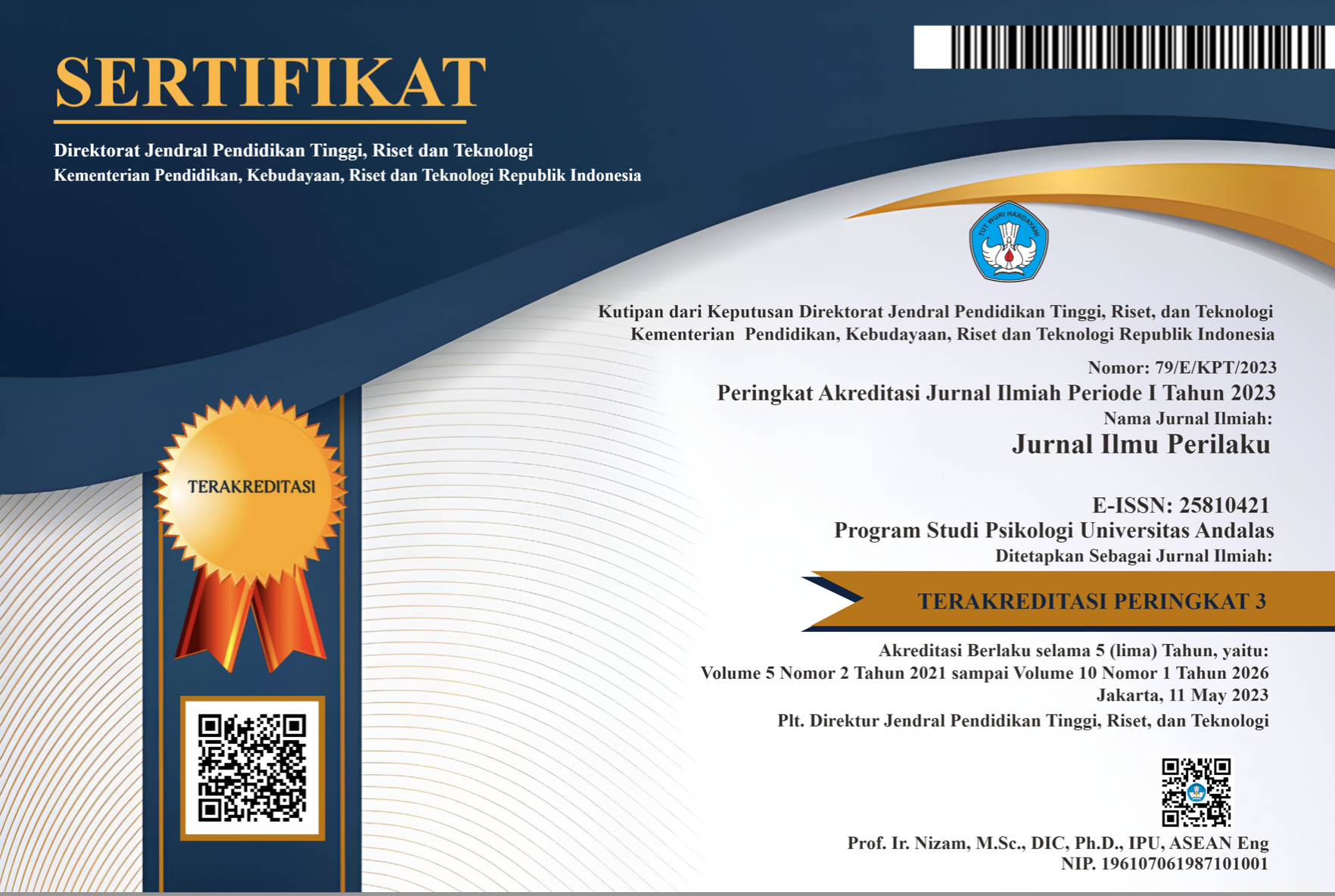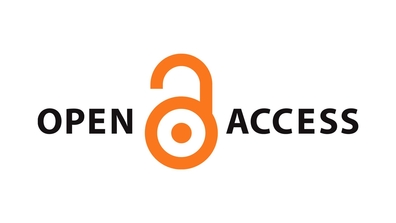Literasi Kesehatan Mental dan Stigma Publik Sebagai Prediktor Sikap Terhadap Bantuan Psikologis Pada Mahasantri
Abstract
Abstract. This study aimed to examine the relationship between mental health literacy and public stigma with attitudes towards psychological help among Mahasantri Pesanmasa Unissula Semarang. A sample of 225 respondents as the research trial and 174 respondents as the research sample were involved in this study. The sampling technique used cluster sampling. The measuring instrument consisted of the attitude scale towards psychological help a= 0,720, mental health literacy scale a= 0.814 and public stigma scale a= 0,724. The data analysis technique used multiple regression and partial correlation. The results of the first hypothesis test obtained R= 0.286 and F= 7.608 with p= 0,001 (p<0,01) showed that mental health literacy was able to significantly predict attitudes towards psychological help among Mahasantri. The first partial test between mental health literacy and attitudes towards psychological help obtained rx1y= 0.253, p= 0,001 (p<0,01), showed that there was a relationship between mental health literacy and attitudes towards psychological help while the second partial test between public stigma and attitudes towards seeking profesional psychological help obtained rx1y= -0,043 p= 0,570 (p>0,05), meaning that there was no relationship between public stigma and attitudes towards psychological help among Mahasantri.
Keywords: Attitudes towards psychological help, mental health literacy, public stigma, college students
Downloads
References
Azwar, S. (2018). Reabilitas dan Validitas. Yogyakarta: Pustaka Belajar.
Bonabi, H., Müller, M., Ajdacic-Gross, V., Eisele, J., Rodgers, S., Seifritz, E., Rössler, W., & Rüsch, N. (2016). Mental health literacy, attitudes to help seeking, and perceived need as predictors of mental health service use: A longitudinal study. Journal of Nervous and Mental Disease, 204(4), 321–324. https://doi.org/10.1097/NMD.0000000000000488
Burns, J., & Birrell, E. (2014). Enhancing early engagement with mental health services by young people. Psychology Research and Behavior Management, 7, 303–312. https://doi.org/10.2147/PRBM.S49151
Corrigan, P., W., Roe, D., Tang., H., W., H (2011), Challenging the stigma of mental illnes: Lesson for therapist and advocates. John Willey and Sons.
Fischer, E. H., & Turner, J. I. (1970). Orientations to seeking profesional help: Development and research utility of an attitude scale. Journal of Consultin. Journal of Consulting and Clinical Psychology, 35(1, Pt.1), 79–90. https://doi.org/10.1037/h0029636
Goffman, E. (2003). Key Ideas in Sociology. In Key Ideas in Sociology (pp. 185–186). Nelson Thomes Ltd.
Grech, A. (2019). Mental health literacy, stigma and attitudes towards seeking help in Malta. (Tesis tidak diterbitkan). Department of Sociology. University of Malta, Malta.
Ibrahim, N., Amit, N., Shahar, S., Wee, L. H., Ismail, R., Khairuddin, R., Siau, C. S., & Safien, A. M. (2019). Do depression literacy, mental illness beliefs and stigma influence mental health help-seeking attitude? A cross-sectional study of secondary school and university students from B40 households in Malaysia. BMC Public Health, 19 (Suppl 4), 1–8. https://doi.org/10.1186/s12889-019-6862-6
Ilmy, S. K., Noorhamdani, & Windarwati, H. D. (2020). Factors associated with pasung (seclusion and restraint) in Indonesia: A systematic review. International Journal of Science and Society, 2(3), 248–258.
Jorm, A. F. (2012). Mental health literacy: empowering the community to take action for better mental health. Am Psychol., 67(3), 231-43. doi: 10.1037/a0025957.
Jorm, A. F., Korten, A. E., Jacomb, P. A., Christensen, H., Rodgers, B., & Pollitt, P. (1997). “Mental health literacy”: A survey of the public’s ability to recognise mental disorders and their beliefs about the effectiveness of treatment. Medical Journal of Australia, 166(4), 182–186. https://doi.org/10.5694/j.1326-5377.1997.tb140071.x
Kartikasari, N., & Ariana, A. D. (2019). Hubungan Antara Literasi Kesehatan Mental, Stigma Diri Terhadap Intensi Mencari Bantuan Pada Dewasa Awal. INSAN Jurnal Psikologi Dan Kesehatan Mental, 4(2), 64. https://doi.org/10.20473/jpkm.v4i22019.64-75
Komiya, N., Good, G. E., & Sherrod, N. B. (2000). Emotional openness as a predictor of college students’ attitudes toward seeking psychological help. Journal of Counseling Psychology, 47(1), 138–143. https://doi.org/10.1037/0022-0167.47.1.138
Lestari, N. W., Soeharto, S., & Windarwati, H. D. (2020). Reasons Pasung in People with Mental Disorders. 12(4), 195-197.
Link, B. G. (1987). Understanding Labeling Effects in the Area of Mental Disorders: An Assessment of the Effects of Expectations of Rejection. American Sociological Review, 52(1), 96. https://doi.org/10.2307/2095395
Maya, N. (2020). Pengaruh literasi kesehatan mental dan persepsi stigma publik terhadap sikap mencari bantuan profesional psikologi pada remaja kota bandung Universitas Pendidikan Indonesia.
Nam, S. K., Choi, S. I., Lee, J. H., Lee, M. K., Kim, A. R., & Lee, S. M. (2013). Psychological factors in college students’ attitudes toward seeking profesional psychological help: A meta-analysis. Profesional Psychology: Research and Practice, 44(1), 37–45. https://doi.org/10.1037/a0029562
O’Connor, M., & Casey, L. (2015). The Mental Health Literacy Scale (MHLS): A new scale-based measure of mental health literacy. Psychiatry Research, 229(1–2), 511–516. https://doi.org/10.1016/j.psychres.2015.05.064
Rasyida, A. (2019). Faktor yang menjadi hambatan untuk mencari bantuan psikologis formal di kalangan mahasiswa. Persona:Jurnal Psikologi Indonesia, 8(2), 193–207. https://doi.org/10.30996/persona.v8i2.2586
Rickwood, D., & Thomas, K. (2012). Conceptual measurement framework for help-seeking for mental health problems. Psychology Research and Behavior Management, 5, 173–183. https://doi.org/10.2147/PRBM.S38707
Riset Kesehatan Dasar. (2018). Hasil Utama Riset Kesehatan Dasar. Kementrian Kesehatan Republik Indonesia, 1–100.
Rogers-Sirin, L., Yanar, C., Yüksekbaş, D., Senturk, M. I., & Sirin, S. (2017). Religiosity, Cultural Values, and Attitudes Toward Seeking Psychological Services in Turkey. Journal of Cross-Cultural Psychology, 48(10), 1587–1604. https://doi.org/10.1177/0022022117732532
Semrau, M., Evans-Lacko, S., Koschorke, M., Ashenafi, L., & Thornicroft, G. (2014). Stigma and discrimination related to mental illness in low- and middle-income countries. Epidemiology and Psychiatric Sciences, 24(5), 382–394. https://doi.org/10.1017/S2045796015000359
Soebiantoro, J. (2017). Pengaruh Edukasi Kesehatan Mental Intensif Terhadap Stigma pada Pengguna Layanan Kesehatan Mental. INSAN Jurnal Psikologi Dan Kesehatan Mental, 2(1), 1. https://doi.org/10.20473/jpkm.v2i12017.1-21
Sukardi. (2013). Metodologi Penelitian Pendidikan Kompetensi dan Praktiknya (pp. 57–58). PT. Bumi Aksara.
Sugiyono. (2019). Metode Penelitian Kuantitatif, Kualitatif, dan R&D. Bandung: Alfabeta.
Syafitri, D. U. (2019). Literasi Kesehatan Mental pada Mahasiswa di Kota Semarang (Vol. 5, Issue 1).
Syafitri, D. U., & Kusumaningsih, L. P. S. (2021). Sikap terhadap bantuan psikologis (tatap muka dan daring) ditinjau dari penyembunyian diri, harapan pengungkapan, dan stigma diri pada mahasiswa. Jurnal Ilmiah Psikologi Terapan, 9(1), 84. https://doi.org/10.22219/jipt.v9i1.14151
Uwakwe, R., & Otakpor, A. (2014). Public mental health - using the Mental Health Gap Action Program to put all hands to the pumps. Frontiers in Public Health, 2(APR), 1–5. https://doi.org/10.3389/fpubh.2014.00033
Widodo, A., Prabandari, Y. S., Sudiyanto, A., & Rahmat, I. (2019). Increasing the Quality of Life of Post Shackling Patients Through Multilevel Health Promotion of Shackling Prevention. Bali Medical Journal, 8(2), 678. https://doi.org/10.15562/bmj.v8i2.1470.

This work is licensed under a Creative Commons Attribution-NonCommercial-ShareAlike 4.0 International License.
The non-commercial use of the article is governed by the Creative Commons Attribution license as currently displayed on Creative Commons Attribution-NonCommercial-ShareAlike 4.0 International License.
JIP's spirit is to disseminate articles published are as free as possible. Under the Creative Commons license, JIP permits users to copy, distribute, display, and perform the work for non-commercial purposes only. Users will also need to attribute authors and JIP on distributing works in the journal.
Please find the rights and licenses in Jurnal Ilmu Perilaku (JIP).
- License
The non-commercial use of the article will be governed by the Creative Commons Attribution license as currently displayed on Creative Commons Attribution-NonCommercial-ShareAlike 4.0 International License.
- Author’s Warranties
The author warrants that the article is original, written by stated author(s), has not been published before, contains no unlawful statements, does not infringe the rights of others, is subject to copyright that is vested exclusively in the author and free of any third party rights, and that any necessary written permissions to quote from other sources have been obtained by the author(s).
- User Rights
JIP's spirit is to disseminate articles published are as free as possible. Under the Creative Commons license, JIP permits users to copy, distribute, display, and perform the work for non-commercial purposes only. Users will also need to attribute authors and JIP on distributing works in the journal.
- Rights of Authors
Authors retain the following rights:
- Copyright, and other proprietary rights relating to the article, such as patent rights,
- The right to use the substance of the article in future own works, including lectures and books,
- The right to reproduce the article for own purposes, provided the copies are not offered for sale,
- The right to self-archive the article.
- Co-Authorship
If the article was jointly prepared by other authors, the signatory of this form warrants that he/she has been authorized by all co-authors to sign this agreement on their behalf, and agrees to inform his/her co-authors of the terms of this agreement.
- Termination
This agreement can be terminated by the author or JIP upon two months’ notice where the other party has materially breached this agreement and failed to remedy such breach within a month of being given the terminating party’s notice requesting such breach to be remedied. No breach or violation of this agreement will cause this agreement or any license granted in it to terminate automatically or affect the definition of JIP.
- Royalties
This agreement entitles the author to no royalties or other fees. To such extent as legally permissible, the author waives his or her right to collect royalties relative to the article in respect of any use of the article by JIP or its sublicensee.
- Miscellaneous
JIP will publish the article (or have it published) in the journal if the article’s editorial process is successfully completed and JIP or its sublicensee has become obligated to have the article published. JIP may conform the article to a style of punctuation, spelling, capitalization, referencing and usage that it deems appropriate. The author acknowledges that the article may be published so that it will be publicly accessible and such access will be free of charge for the readers.










